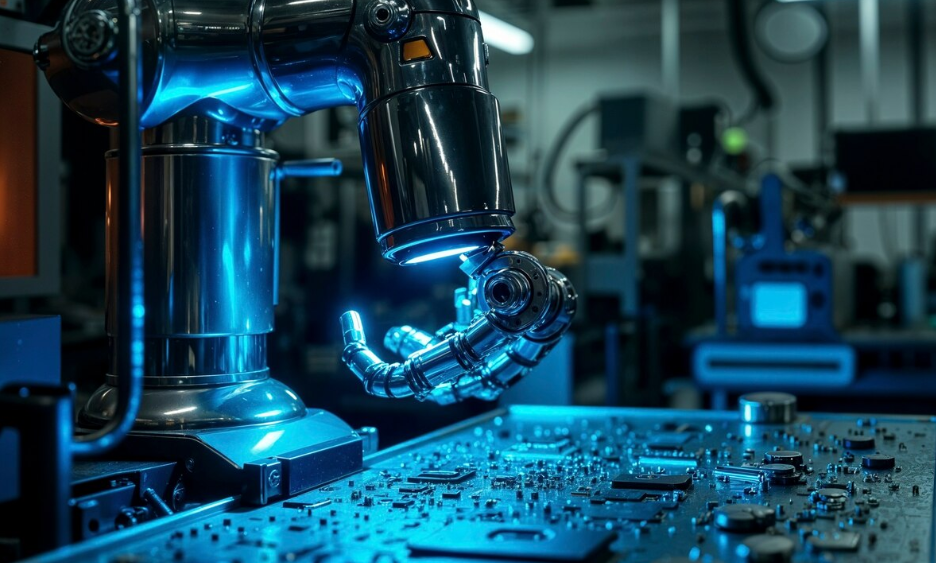Artificial Intelligence (AI) has made significant strides in recent years, transforming many industries across the globe. One of the sectors where AI is having the most profound impact is healthcare. From diagnosing diseases to personalizing treatment plans, AI is enhancing healthcare systems and improving patient outcomes in ways that were once considered futuristic. This article will explore how AI is revolutionizing healthcare systems and its potential to shape the future of medicine.
AI in Healthcare: An Overview
AI in healthcare refers to the use of machine learning, deep learning, and other advanced technologies to assist in tasks such as data analysis, decision-making, and patient care. By leveraging large datasets, AI algorithms can identify patterns, predict outcomes, and make recommendations, enabling healthcare providers to make more informed decisions.
The key benefits of AI in healthcare include:
- Efficiency: AI can automate routine tasks, reduce administrative burdens, and streamline processes, allowing healthcare professionals to focus on direct patient care.
- Accuracy: AI models can analyze complex medical data with high precision, leading to more accurate diagnoses and treatment plans.
- Personalization: AI can help tailor treatments to individual patients by analyzing genetic, environmental, and lifestyle data.
- Access: AI-powered tools can increase access to healthcare services, especially in underserved areas, by providing remote diagnostic tools and virtual healthcare.
Let’s take a closer look at how AI is transforming various aspects of healthcare systems.
1. AI in Diagnostics and Disease Detection
One of the most impactful applications of AI in healthcare is in diagnostics and disease detection. Traditionally, diagnosing diseases has been a complex and time-consuming process, often requiring multiple tests and consultations. AI can assist doctors by analyzing medical images, genetic data, and patient history to identify diseases earlier and more accurately.
- Medical Imaging: AI algorithms, particularly those based on deep learning, are now capable of analyzing medical images (e.g., X-rays, MRIs, CT scans) with incredible accuracy. AI can detect abnormalities such as tumors, fractures, and infections that might be missed by the human eye.
- Example: Google Health has developed an AI system that can detect breast cancer in mammograms with greater accuracy than human radiologists.
- Example: Google Health has developed an AI system that can detect breast cancer in mammograms with greater accuracy than human radiologists.
- Early Detection: AI can help identify patterns in patient data that indicate early signs of diseases such as cancer, diabetes, and heart disease. By detecting these conditions earlier, AI can facilitate earlier interventions and improve patient outcomes.
- Example: IBM’s Watson for Oncology uses AI to analyze cancer patients’ medical records and recommend personalized treatment options based on the latest research.
- Example: IBM’s Watson for Oncology uses AI to analyze cancer patients’ medical records and recommend personalized treatment options based on the latest research.
By improving diagnostic accuracy, AI is helping healthcare professionals catch diseases in their early stages, which is crucial for improving survival rates.
2. AI in Personalized Medicine
Personalized medicine refers to the customization of healthcare treatments to individual patients based on their unique genetic, environmental, and lifestyle factors. AI plays a key role in personalizing medicine by analyzing vast amounts of data to identify the most effective treatment for each patient.
- Genomic Data Analysis: AI can analyze genetic data to identify mutations or markers that increase the risk of certain diseases. This enables healthcare providers to develop targeted therapies tailored to a patient’s genetic profile.
- Example: AI is being used in genomic research to identify new genetic mutations linked to diseases such as Alzheimer’s and Parkinson’s, enabling more precise treatments.
- Example: AI is being used in genomic research to identify new genetic mutations linked to diseases such as Alzheimer’s and Parkinson’s, enabling more precise treatments.
- Treatment Optimization: AI algorithms can analyze a patient’s medical history, current condition, and other factors to recommend the best treatment options. This ensures that patients receive the most effective therapies, reducing the risk of adverse reactions and improving recovery rates.
- Example: Tempus, a technology company, uses AI to analyze clinical and molecular data to help oncologists select the best cancer treatments for individual patients.
- Example: Tempus, a technology company, uses AI to analyze clinical and molecular data to help oncologists select the best cancer treatments for individual patients.
With AI’s ability to analyze complex datasets, personalized medicine is making it possible to move away from a one-size-fits-all approach to healthcare.
3. AI in Virtual Health Assistants
The rise of virtual health assistants is another way AI is transforming healthcare. These AI-powered tools can provide patients with round-the-clock access to healthcare advice, reminders, and support.
- Chatbots and Virtual Assistants: AI chatbots and virtual assistants can answer patient questions, offer medical advice, and schedule appointments. They can also help with routine tasks such as prescription refills, sending reminders for medication, and tracking symptoms.
- Example: Ada Health is an AI-powered app that acts as a virtual health assistant. Patients input their symptoms, and the app uses AI to suggest possible causes and recommend next steps, helping patients decide whether to seek medical attention.
- Example: Ada Health is an AI-powered app that acts as a virtual health assistant. Patients input their symptoms, and the app uses AI to suggest possible causes and recommend next steps, helping patients decide whether to seek medical attention.
- Remote Monitoring: AI-powered tools can monitor patients remotely, especially those with chronic conditions. These tools can track vital signs, analyze trends in patient data, and alert healthcare providers if there are any concerning changes.
- Example: Devices like smartwatches use AI to monitor heart rate, sleep patterns, and physical activity. Some systems even monitor for early signs of heart disease or strokes, alerting users and healthcare providers.
- Example: Devices like smartwatches use AI to monitor heart rate, sleep patterns, and physical activity. Some systems even monitor for early signs of heart disease or strokes, alerting users and healthcare providers.
By providing accessible healthcare support and empowering patients to take control of their health, AI is reducing the burden on healthcare providers and improving patient outcomes.
4. AI in Drug Discovery and Development
Developing new medications is a lengthy and expensive process, often taking years to bring a drug to market. AI is revolutionizing drug discovery by significantly speeding up the process and improving the likelihood of success.
- Predicting Drug Effectiveness: AI algorithms can analyze chemical compounds and predict which ones are most likely to be effective in treating specific diseases. This reduces the time spent on trial and error, enabling researchers to focus on the most promising drug candidates.
- Example: BenevolentAI uses AI to identify potential drug candidates for diseases such as Alzheimer’s and rare genetic disorders by analyzing large datasets of biomedical information.
- Example: BenevolentAI uses AI to identify potential drug candidates for diseases such as Alzheimer’s and rare genetic disorders by analyzing large datasets of biomedical information.
- Clinical Trials: AI can also improve clinical trial design by analyzing patient data to identify suitable candidates for trials, predicting how patients will respond to treatments, and monitoring trial results in real-time.
- Example: Pfizer is using AI to optimize its clinical trials by analyzing patient data to identify those who are more likely to benefit from a particular treatment, improving the chances of trial success.
- Example: Pfizer is using AI to optimize its clinical trials by analyzing patient data to identify those who are more likely to benefit from a particular treatment, improving the chances of trial success.
AI’s ability to process large datasets and predict outcomes is accelerating the development of new drugs, making it possible to bring treatments to market more quickly.
5. AI in Administrative Tasks and Operational Efficiency
AI is not only enhancing patient care but also improving the operational efficiency of healthcare systems. Healthcare providers often face significant administrative burdens, which can lead to inefficiencies and increased costs. AI is being used to automate many of these tasks, allowing healthcare professionals to focus on patient care.
- Automating Documentation: AI-powered tools can automate tasks like medical coding, billing, and documentation. This reduces administrative costs, minimizes human error, and speeds up processes.
- Example: DeepScribe, an AI-powered platform, transcribes and organizes patient interactions, allowing physicians to spend more time with their patients and less time on paperwork.
- Example: DeepScribe, an AI-powered platform, transcribes and organizes patient interactions, allowing physicians to spend more time with their patients and less time on paperwork.
- Predictive Analytics: AI can analyze historical patient data to predict patient outcomes, such as hospital readmission rates or the likelihood of complications. This allows healthcare systems to allocate resources more efficiently and intervene before problems arise.
- Example: Hospitals use AI to predict which patients are at high risk of complications, enabling them to provide more targeted care and prevent unnecessary readmissions.
- Example: Hospitals use AI to predict which patients are at high risk of complications, enabling them to provide more targeted care and prevent unnecessary readmissions.
By automating administrative tasks and improving resource allocation, AI is helping healthcare systems become more efficient and cost-effective.
Conclusion
Artificial Intelligence is undoubtedly revolutionizing healthcare systems, from improving diagnostic accuracy and personalizing treatment plans to optimizing operations and accelerating drug discovery. The integration of AI in healthcare is enabling providers to offer more efficient, effective, and accessible care while reducing costs and enhancing patient outcomes.
As AI technology continues to evolve, its role in healthcare will only expand. With advancements in machine learning, data analysis, and automation, the future of healthcare looks brighter, with AI playing a crucial role in improving the quality of care and making healthcare services more widely available to people around the world.


